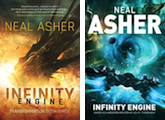As I’ve previously stated: “If I could travel into the future, my first port of call would be where medical technology is at its best because, like most people on this planet, I have this aversion to dying.”
Immortality is a constant theme in SF, but what style of immortality? Throughout SF you can see appeals to some power to this end. They extend from those with a religious and supernatural basis to the scientific. That appeal has always existed because we do and always have had this “aversion to dying.” Arguably it is the driver behind belief in the supernatural. Arguably it is behind the “scientific belief” in the AI singularity often been labelled “the Rapture of Nerds.”
In Philip Jose Farmer’s Riverworld we are resurrected to eternal life in new bodies on a world covered with a giant river valley. We awake on the banks of this river in perfect 25-year-old bodies, which can regenerate from just about any injury, and remain at that age forever. No severed limbs, no wheelchairs, sight restored if lost, no tooth decay. Provision is even made for those who died young. They are resurrected at the age they died, grow to 25-year-olds and so remain. This is a direct translation of religion into an sfnal setting, and its source is hinted at all through. The resurrected get their sustenance from “Grails,” while one wonders why all the men are reborn without foreskins. The heavenly host, the alien Wathans, created the place for “moral contemplation” where humans can lose their barbarity in preparation for moving on. But still, that contemplation involves numerous adventures with historical figures—the explorer Sir Richard Burton is a main character—and the books are an enjoyable ride.
Mind of my Mind by Octavia Butler describes an immortal telepath called Doro, who can transfer himself from body to body. Throughout his long life he has been running a breeding program to create more telepaths—a uniquely powerful group of humans. This is a bleak tale with a nasty, murderous villain in the form of Doro, that explores the “super-human.” But it is also a reflection of another well-known tale. An ancient immortal who kills to continue living while raising up lesser versions of himself? Subjugating and controlling those around him? Mind of my Mind is Dracula with a large sfnal twist, excellently done of course, but still lingering in the realm of the supernatural.
The immortality in The Healer by F. Paul Wilson is via a parasitic alien that drops on the protagonist in a cave and alters his body so it will not die. The Healer is able to cure people with a laying on of hands that seems straight out of the Bible, but has strayed out of the realm of the supernatural and into that of parasite biology. Parasites can do a lot to their hosts and usually it is unpleasant. They can even control a host’s mind—usually to make it more available as food for said parasite’s next host. But while occupying a body, it does not want to be eaten by anything but its next host. There is one that occupies a snail, for example, and causes it to grow a more protective shell. It is not a stretch to imagine extended life resulting from parasitism because there is biological reasoning behind it. I do this myself in The Skinner whereby humans are transformed into tough immortals by a virus imparted by the bite of a leech. Those humans become an undying reusable food source for the leeches, which makes sense in the utterly pragmatic and ruthless natural world.
A further biological twist arises in Protector by Larry Niven. We were never meant to die because we are of another race, the Pak, but missing an essential food item that switches us to a stage of immortal existence. All the negative characteristics of aging are in fact the failure of a breeder (one of us) to turn into the super strong and intelligent fighting machine that is a Protector: the toughening skin, enlarged joints, loss of our teeth, dietary changes. There are also links here to the “grandmother hypothesis”—we live long after ceasing to breed because as caregivers to our grandchildren we ensure our genes are passed on. This book follows a biological logic with a large injection of imagination. It’s a virus in the roots of the “tree of life” (bit like a sweet potato) that causes this transformation. The story itself concerns the journey of a Pak to a lost colony of breeders and what ensues when he arrives. That colony is Earth and we are those breeders.
Finally, we have the contemporary Altered Carbon by Richard Morgan. Like computer programs we can be recorded to cortical stacks planted in our skulls. From these we can be downloaded to new bodies, or “sleeves.” The idea that we can go into computer storage is much in vogue in SF now because in the computer age everything can be stored digitally, while we are mapping the mind and making digital interfaces with it. I could have chosen any of a number of books (including my own) to illustrate this but I selected Altered Carbon simply because it is a honking good read and a blast. Interestingly, even here, ideas of Heaven and Hell arise. Humans can live endlessly in virtual worlds, though in this dystopia they are mainly tortured endlessly in virtual hells. And the “sleeves”? Why not in this age when we are 3D printing organs?
However, this last is the best version of immortality we have in SF now. Who knows what’s round the corner?
 Neal Asher lives sometimes in England, sometimes in Crete and mostly at a keyboard. He’s had twenty-three books published and can now call himself an author without cringing. He’s also read more SF than some would style as healthy. His latest book, Infinity Engine, is now available from Tor UK and Night Shade in the US. Find him online at his blog, or on Twitter @nealasher.
Neal Asher lives sometimes in England, sometimes in Crete and mostly at a keyboard. He’s had twenty-three books published and can now call himself an author without cringing. He’s also read more SF than some would style as healthy. His latest book, Infinity Engine, is now available from Tor UK and Night Shade in the US. Find him online at his blog, or on Twitter @nealasher.











